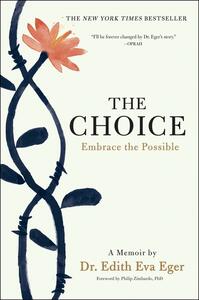You need to sign in or sign up before continuing.
Take a photo of a barcode or cover
pensé que iba a ser una novela histórica biográfica y termino siendo eso y un libro de motivación personal, las primeras partes me gustaron mucho, cuando contaba su historia y lo que vivió en auschwitz, todo muy doloroso y súper importante conocerlo, pero el resto no me gustó nada, no me gusta el discurso "si yo puedo tu puedes superarlo", tampoco me gusta que la autora diga que cada uno puede elegir ser libre ante su dolor. A pesar de las cosas que no me gustaron encuentro importante seguir leyendo y conociendo testimonios de las personas que vivieron todo esto
emotional
hopeful
sad
medium-paced
challenging
dark
emotional
hopeful
informative
inspiring
reflective
sad
challenging
dark
hopeful
reflective
medium-paced
The Choice is a beautiful memoir of Dr. Edith Eva Eger and her story of healing from her tragic experience in Auschwitz and trauma. I felt it is a sequel of Man's Search for Meaning after seven decades of Victor Frankl's initial work (as you read the book, you will discover how she encountered his book, exchange letters with him, and collaborated with him). While Man's Search for Meaning by Victor Frankl is about the psychology of prisoner, the Choice by Dr. Eger is the psychology of freedom, which is the process and choice towards healing from trauma and sense of deep guilt.
We all have regret, guilt and grief over the past actions we made. For Dr. Edith Eger, it was what she said when she, her sister, and mother were standing together waiting and being interrogated by Dr. Josef Mengele (known as Angel of Death) during the selection process. He asked Edith if the woman with her was her sister or mother. She answered that it was her mother. They were then separated. Her mother was sent to the line that meant immediate death while Edith and her sister were sent to the other line. Even decades after her survival from holocaust, Dr. Eger grieved over this and regrets she could have saved her mother if she said it was her sister.
How did she confront her guilt and shame from this experience? Could she overcome this trauma? Although most of our own regrets and griefs are less likely to be as tragic and traumatic as hers, her memoir might make you believe that it can be possible to heal even from such a severe trauma and guilt. As Dr. Eger said, we often become our own jailer and creating prison of your own mind. We can't change the past and it is entirely possible to put us into the prison of self-blame. Maybe healing starts by embracing that there is the possibility and the choice to focus on what we still have now, instead of what we've lost. Maybe healing isn't to erase the scar (forget the past, running away from the pain). Maybe healing is to cherish the wound (acceptance and letting go the all blame including victimizing yourself). Maybe moving forward also means circling back...
As I read through the book, there were quite a few moments that I noticed I was very close to cry and yet cherished. So, each phrase from Dr. Eger has the possibility to leave you changed. Such an inspirational book.
Highly recommended for everyone, especially for those who loved the book from Victor Frankl.
We all have regret, guilt and grief over the past actions we made. For Dr. Edith Eger, it was what she said when she, her sister, and mother were standing together waiting and being interrogated by Dr. Josef Mengele (known as Angel of Death) during the selection process. He asked Edith if the woman with her was her sister or mother. She answered that it was her mother. They were then separated. Her mother was sent to the line that meant immediate death while Edith and her sister were sent to the other line. Even decades after her survival from holocaust, Dr. Eger grieved over this and regrets she could have saved her mother if she said it was her sister.
How did she confront her guilt and shame from this experience? Could she overcome this trauma? Although most of our own regrets and griefs are less likely to be as tragic and traumatic as hers, her memoir might make you believe that it can be possible to heal even from such a severe trauma and guilt. As Dr. Eger said, we often become our own jailer and creating prison of your own mind. We can't change the past and it is entirely possible to put us into the prison of self-blame. Maybe healing starts by embracing that there is the possibility and the choice to focus on what we still have now, instead of what we've lost. Maybe healing isn't to erase the scar (forget the past, running away from the pain). Maybe healing is to cherish the wound (acceptance and letting go the all blame including victimizing yourself). Maybe moving forward also means circling back...
As I read through the book, there were quite a few moments that I noticed I was very close to cry and yet cherished. So, each phrase from Dr. Eger has the possibility to leave you changed. Such an inspirational book.
Highly recommended for everyone, especially for those who loved the book from Victor Frankl.
challenging
emotional
hopeful
informative
inspiring
reflective
sad
medium-paced
dark
emotional
inspiring
medium-paced
challenging
dark
emotional
funny
hopeful
inspiring
reflective
medium-paced




